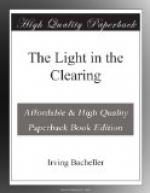“Her father is a bit too fond o’ money. I’ve never been hard struck with him. It has always seemed to me that he was afflicted with perfection—a camellia man!—so invariably neat and proper and conventional! Such precise and wearisome rectitude! What a relief it would be to see him in his shirt-sleeves or with soiled boots or linen or to hear him say something—well-unexpected! Six shillings a week to the church and four to charity, as if that were the contract—no more, no less! But did ye ever hear o’ his going out o’ his way to do a good thing—say to help a poor woman left with a lot o’ babies or a poor lad that wants to go to school? ’No, I’m very sorry, but I give four shillings a week to charity and that’s all I can afford.’”
“Why did they go away? Was it because I was coming?”
“I think it likely, my fine lad. The man heard o’ it some way—perhaps through yer uncle. He’s crazy for the money, but he’ll get over that. Leave him to me. I’ve a fine course o’ instruction ready for my Lord o’ Dunkelberg.”
“I think I shall go and try to find her,” I said.
“I am to counsel ye about that,” said the schoolmaster. “She’s as keen as a brier—the fox! She says, ’Keep away. Don’t alarm him, or he’ll bundle us off to Europe for two or three years.’
“So there’s the trail ye travel, my boy. It’s the one that keeps away. Don’t let him think ye’ve anything up the sleeve o’ yer mind. Ye know, lad, I believe Sally’s mother has hold o’ the same rope with her and when two clever women get their wits together the divvle scratches his head. It’s an old sayin’, lad, an’ don’t ye go out an’ cut the rope. Keep yer head cool an’ yer heart warm and go right on with yer business. I like the whole plan o’ this remarkable courtship o’ yours.”
“I guess you like it better than I do,” was my answer.
“Ah, my lad, I know the heart o’ youth! Ye’d like to be puttin’ yer arms around her—wouldn’t ye, now? Sure, there’s time enough! You two young colts are bein’ broke’ an’ bitted. Ye’ve a chance now to show yer quality—yer faith, yer loyalty, yer cleverness. If either one o’ ye fails that one isn’t worthy o’ the other. Ye’re in the old treadmill o’ God—the both o’ ye! Ye’re bein’ weighed an’ tried for the great prize. It’s not pleasant, but it’s better so. Go on, now, an’ do yer best an’ whatever comes take it like a man.”
A little silence followed. He broke it with these words:
“Ye’re done with that business in Cobleskill, an’ I’m glad. Ye didn’t know ye were bein’ tried there—did ye? Ye’ve stood it like a man. What will ye be doin’ now?”
“I’d like to go to Washington with the Senator.”
He laughed heartily.
“I was hopin’ ye’d say that,” he went on. “Well, boy, I think it can be arranged. I’ll see the Senator as soon as ever he comes an’ I believe he’ll be glad to know o’ yer wishes. I think he’s been hopin’, like, that ye would propose it. Go up to the farm and spend a happy month or two with yer aunt an’ uncle. It’ll do ye good. Ye’ve been growin’ plump down there. Go an’ melt it off in the fields.”




